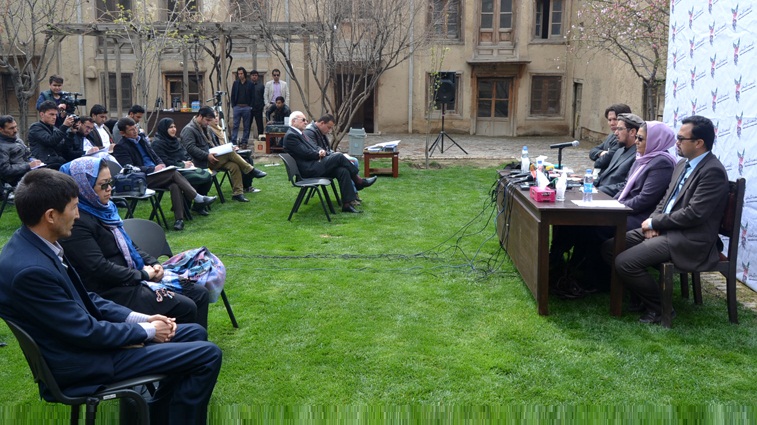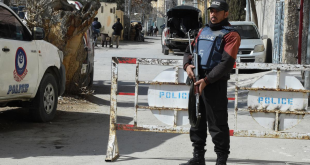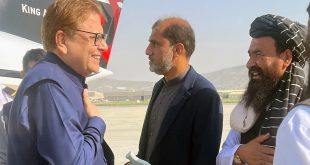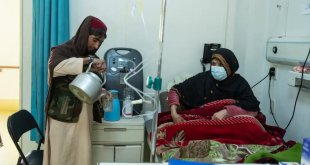Peace talks with Taliban failed; HPC a symbolic body; Afghan officials lack consensus over peace with militants; women’s status will become worse after peace deal; Taliban fight for Pakistan’s interest
AT-KABUL: Pakistan, regional countries, the United State and the West see their interests in war and insecurity in Afghanistan, a survey said.
According to the survey launched by the Afghanistan Institute for Strategic Studies (AISS) on Monday, 48 percent of the respondents believe that the current war in the country is in the interest of Pakistan and the West, including the US. The survey has been launched in 15 provinces. The institute interviewed 1,540 people.
Approximately 48 percent of the respondents believe that Pakistan and countries in the region benefit the most from the war and insecurity in Afghanistan. America and the West with 20 per cent and the corrupt government officials with about 17 percent are the second and the third respectively, the survey report said.
According to the results of the research 70.6% of respondents believe that government peace talks with the Taliban have been “failed”. In addition, 21.5 % of them believe that it has been “partly successful”.
Ghulam Reza Ebrahimi, a researcher in the AISS, said that interference of the regional countries is the main factor of the Afghan government’s failure.
Briefing newsmen on the survey findings, he said that 33.6% of the respondents believe that the “interference of the neighboring and regional countries” is the main factor responsible for the failure of government’s peace talk with the Taliban. Almost 31% of the respondents see “the weakness of the Afghan government” as the reason of the failure. About 14% of the respondents know “the interference of the America and the West” as the main cause of the failure. And 9.4% of the respondents pointed that the failure is because of “not including people in the peace talks”.
The respondents termed the High Peace Council a symbolic body crippled by different problems such as corruption and lack of authority to hold talks with insurgents.
The most important weaknesses of the High Peace Council were listed as: Being a symbolic Council (19.9%); corruption (16.4%); lack of necessary independence and competence (16.2%); lack of public support (14%); and foreign interference in its matters (11.4%).
According to the survey, the Majority of the respondents, 70.7%, believe that “the government authorities do not have consensus about peace with the Taliban”.
Almost 86% of the respondents described the importance of the people’s role in the peace process as “high” (54.4%) and “very high” (31.4%). Nearly 62% of respondents described the importance of the women’s role in peace making “high” (34.5%) and “very high” (27.3%). Almost 28% of the respondents see the importance of the women’s role “very little” (11%) and “little” (17.4%). And about 10% of the respondents believe that women’s role in peace making “is not important”.
Based on the report, 60.2% of the respondents believe that after peace with the Taliban, “status of women will get worse”. Moreover, 10.8% of them think that “status of women will get better”. And 18.7% of the respondents believe that “status of women will not change”.
Almost 77% of the respondents believe that the Taliban actions “are unacceptable”.
Hussain Ali Karimi, a researcher at the AISS’s Department of Peace Studies, said that most of the respondents believe that the Taliban are fighting to safeguard Pakistan’s interests.
Relatively majority of the respondents, 28.4%, see the main reason of the Taliban fighting as “assuring Pakistan’s interests”. 25.9% of the respondents believe that the Taliban are fighting for “power”. About 13% thinks than they fight to “assure foreign countries’ interests”.
Around 63.3% of the respondents considered it appropriate to call the Taliban as “enemy” (24.4%), “terrorist” (19.9%), and “mercenaries” (19%). Only 1.8% of them were agreed to title the Taliban as “Mujahidin”.
From respondents’ point of view, Afghanistan’s Ulema Council can have the greatest impact on the peace talks’ success (3.4). The mass media like TV, radio and newspapers (3.38) and jihadi leaders and tribal elders (3.1) from respondents’ perspective are at the second and third rank respectively.
The survey found the people have serious concerns about the transparency, process, and the content of the talks. Although, they consider peace as a basic necessity but they do not want it to cost. The constitution and achievements of the past 14 years are important for them and in other words, these are redlines which should be strictly observed in the peace process.
“Growing insecurity and violence in the country has a clear message. The message is that the efforts made to bring peace had not produced tangible results for the people of Afghanistan. There are serious doubts about the achievements of the High Peace Council which is the official address of the Afghan government for peace negotiations. It is time that our government officials reach a consensus on the issue of peace with the Taliban; otherwise we will be witnessing a repeat of the violence, insecurity, a surge in migration, poverty, unemployment and lack of investment in basic economic sectors of our country,” the report suggested.
 Afghanistan Times
Afghanistan Times




